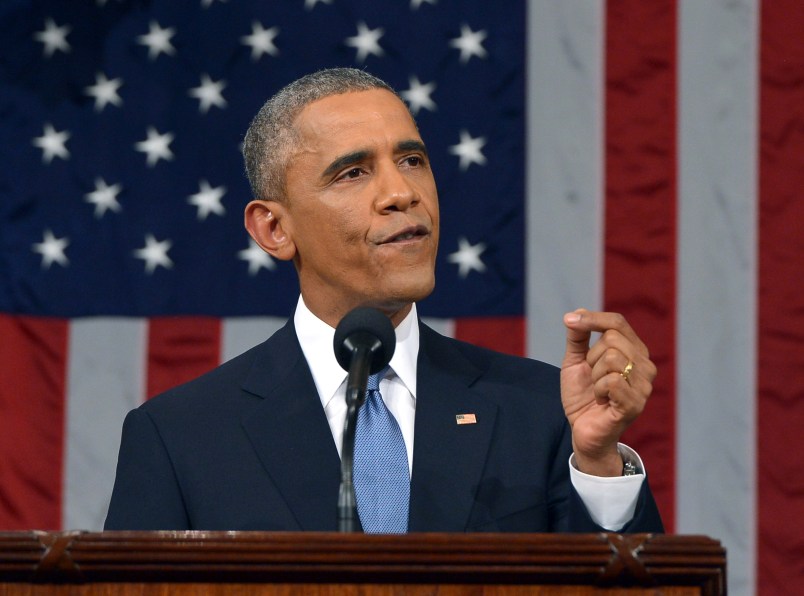The standout theme of President Barack Obama’s penultimate State of the Union speech was that it’s time to move past the crises that have ravaged the United States in the 21st century — most notably post-9/11 ground wars and the worst recession since the Great Depression.
“We are fifteen years into this new century. Fifteen years that dawned with terror touching our shores, that unfolded with a new generation fighting two long and costly wars, that saw a vicious recession spread across our nation and the world. It has been, and still is, a hard time for many,” the president said.
“But tonight, we turn the page.”
In laying out his vision for an era less dominated by wrenching crises, Obama made an aggressive case for a progressive economic philosophy in which government serves as an agent to boost stagnating middle class wages and fortunes — an effort to close the chapter on the Ronald Reagan era of small government.
In keeping with the usual theatrics, Republicans largely sat motionless while Democrats stood up to applaud and cheered raucously at various moments while Obama talked up ideas like middle class tax cuts, equal pay for women, paid sick leave, raising the minimum wage, making community college free and attacking climate change.
“We need to set our sights higher than just making sure government doesn’t screw things up,” he said.
The lingering entanglements of the post-9/11 world were still present, even as Obama touted his moves to wind down the ground wars in Iraq and Afghanistan. He reasserted the need to use “military power” against the Islamic State and called on Congress to authorize the use of military force against the radical Islamic group.
Overall, the speech featured a liberated Obama — free of the political torments of ever having to run for office again, free of worrying about Democrats’ prospects in another midterm election on his watch. Yet he is now stymied by a new Republican-led Congress for the first time in his presidency. He warned against GOP efforts to undo his legacy, threatening vetoes of bills that would roll back Obamacare, immigration executive actions, and financial reform.
One issue where he made a genuine plea for cooperation was new trade deals.
“I’m asking both parties to give me trade promotion authority to protect American workers, with strong new trade deals from Asia to Europe that aren’t just free, but fair,” he said. “Look, I’m the first one to admit that past trade deals haven’t always lived up to the hype, and that’s why we’ve gone after countries that break the rules at our expense. But ninety-five percent of the world’s customers live outside our borders, and we can’t close ourselves off from those opportunities.”
The final two years will be rough for Obama, between Republicans thwarting his major ambitions and plotting a swath of investigations of his administration. But on Tuesday night he played offense anyway, making clear he’ll use his veto pen to protect his gains and appeal to history for a more progressive country.
Obama ended by invoking the 2004 Democratic National Convention speech that marked his meteoric rise from unknown state legislator to president of the United States in a mere four years.
“I have no more campaigns to run,” he said. “I know, because I’ve won both of them.”










